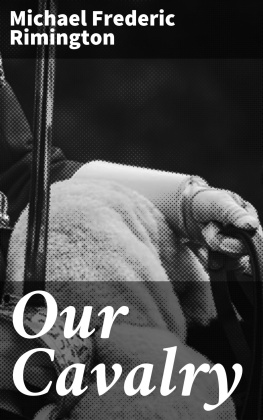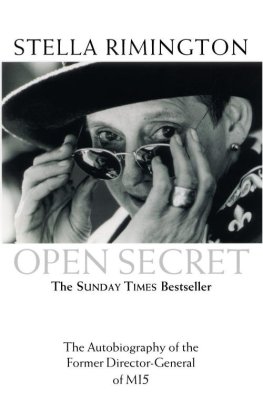Michael Frederic Rimington - Our Cavalry
Here you can read online Michael Frederic Rimington - Our Cavalry full text of the book (entire story) in english for free. Download pdf and epub, get meaning, cover and reviews about this ebook. year: 2021, publisher: Good Press, genre: Romance novel. Description of the work, (preface) as well as reviews are available. Best literature library LitArk.com created for fans of good reading and offers a wide selection of genres:
Romance novel
Science fiction
Adventure
Detective
Science
History
Home and family
Prose
Art
Politics
Computer
Non-fiction
Religion
Business
Children
Humor
Choose a favorite category and find really read worthwhile books. Enjoy immersion in the world of imagination, feel the emotions of the characters or learn something new for yourself, make an fascinating discovery.
- Book:Our Cavalry
- Author:
- Publisher:Good Press
- Genre:
- Year:2021
- Rating:4 / 5
- Favourites:Add to favourites
- Your mark:
- 80
- 1
- 2
- 3
- 4
- 5
Our Cavalry: summary, description and annotation
We offer to read an annotation, description, summary or preface (depends on what the author of the book "Our Cavalry" wrote himself). If you haven't found the necessary information about the book — write in the comments, we will try to find it.
Our Cavalry — read online for free the complete book (whole text) full work
Below is the text of the book, divided by pages. System saving the place of the last page read, allows you to conveniently read the book "Our Cavalry" online for free, without having to search again every time where you left off. Put a bookmark, and you can go to the page where you finished reading at any time.
Font size:
Interval:
Bookmark:
LONDON BOMBAY CALCUTTA
MELBOURNE
THE MACMILLAN COMPANY
NEW YORK BOSTON CHICAGO
DALLAS SAN FRANCISCO
THE MACMILLAN CO. OF CANADA, Ltd.
TORONTO
MAJOR-GENERAL M. F. RIMINGTON
C.V.O., C.B.
ST. MARTINS STREET, LONDON
1912
| Introductory |
| Cavalry in past agesDrawn from horse-lovers, success followed on fixed principles, these are as applicable to-dayBallistics from horsebackAlways a sign and cause of weakeningThe charge of good moralGunpowder and other improvements notwithstandingGood scouts always availableBest lessons are learnt in warExpense of cavalryDuty of cavalry leader Page 1 |
| Armament |
| Constant changesCut v. thrustGerards experiencePoint more deadlyThe case for the lanceThe revolverConfidence in the arm selected is of highest importanceThe rifleThe insistence of continental writers inapplicable to British cavalry Page 10 |
| The Horse |
| Colossal bill for horse-flesh in South Africa largely due to national ignorance of horsesThe suitable horse, two classesChest measurement test for staminaSmall blood horse stands work bestArabs bred for warEnglish and Australian horses for sizeCare of horse in warAn exception to this Page 18 |
| Tactics of Cavalry v. Cavalry |
| The squadron attackCohesionAnd its result in moralTacticsCunningThe rallyCromwellSupportsConclusions Page 29 |
| Cavalry v. Cavalry |
| Forming to the Flank |
| I. The squadronForming to the front or flankDefensive or offensive flank. |
| II. The regiment, advantage of Echelon attack. |
| III. The BrigadeTraining of leadersCo-operation of R.H.A.Two forms of attack, when both forces get away from the gunsFormations for moving to a flankRelative effect of artillery fire on the two formationsColumn of masses preferredFormation for the attackTime for horse artillery to unlimberForm of attack must be simpleConclusions Page 37 |
| Fire Action in Tactics of Cavalry v. Cavalry |
| Not a question to be shirkedDanger of recourse to fire action weakening our leaders desire for shock actionAn instance of fire versus shock actionRifle fire against charging horsemen is ineffectualContradictory memoranda on the subjectHendersons dictumDismounted action of cavalryGerman regulationsPrince Kraft Page 50 |
| Cavalry Brigade in Action |
| First objects in the attackConcentric shock of fire and horsePlan to get a good field of fire by alternate advance of two squadronsDesiderata in artillery positionBroad principlesUtilization of groundDeceptionGet away from our artilleryAn example of attackThe action of the artilleryMoral necessary to leaderUnreasoning hasty advance deprecatedIf anticipated by enemy, how we may have to actPassage of defilesDribbling squadrons into a fightCure for dissemination Page 59 |
| Action of Cavalry in the General Engagement |
| Independent cavalry, danger of their detachment at inopportune timesCavalry and horse artillery at Loigny-Poupry Unsatisfactory direction of cavalry in 187071 followed by peace belief in rifleFallacy of tendency to dismounted action shown by South African and Manchurian WarsThe line our training should takeCavalry instructional ridesValue of initiativeConclusionsFrederick the Greats cavalry compared with our South African cavalryPursuitNeglect of, a British failingThe parallel pursuitIts valueBlcher at Katzbach on cavalry pursuit Page 69 |
| The Disposition of Cavalry in a Campaign |
| Dependence on foragePrinciples on which cavalry is placed in the frontWant of direction in 1870Galliffets influenceService of information separated from that of securityThe Napoleonic traditions revivedAnd generally adoptedFrench viewThe cavalry of explorationThe cavalry of army corpsThe divisional cavalryGeneralissimos use of his independent cavalryMovement en bondesThe effect of modern rifleDifficulties in the attack of protective cavalry and mixed detachments. Page 86 |
| The modern disposition is theoreticalTendency to increase independent cavalry at the expense of protective, for sake of initial advantagesDifficulty of weaker cavalry rleVon Bernhardi on German cavalry strengthImprovisation of cavalryDilemmaCyclistsDifficulty of training for non-professional cavalryDanger of amateur cavalry officersThe Ulm CampaignEffect of first successBoer tactics unsuitable to European war Page 93 |
| Horse Artillery and Cavalry in the General Engagement |
| Deficiency in peace trainingThe energy of the attackAn instancePlan of the attackIn the defenceValue of artillery in the retreat Page 101 |
| Co-operation of Horse Artillery and Cavalry |
| German tendency in 1870 to deprive cavalry of horse artilleryReversed by 1907 regulationsEffect of modern horse artilleryProbable necessity to allocate horse artilleryMukdenArrangement of artillery support in attack on infantrySir Douglas Haig on the counter-attackPrinciplesConclusions Page 108 |
| Horse Artillery Fire Effect compared with Rifle Fire |
| Comparative efficacy in bulletsReasons of Hendersons advocacy of mounted infantryDemand for exceptional arrangementsAn instance of masked fireVon Bernhardis planA suggested alternative Page 117 |
| In Contact with the Enemy |
| Duties of the CommanderA day in the outpostsAt nightThe menThe horsesCare of mens healthWet weatherHints for scoutsMoralSending out scouts at nightSniping by nervous sentriesFirefliesRuses and duplicityValue of a knowledge of strategy and tacticsTo picket an enemySecurity and informationInstances of picketing the enemyPractice in peaceDifficulty of instructionPractice preferred to theoryHonest outpost workNight workRegiments practice of outposts Page 122 |
| Some Detached Duties of Cavalry |
| Despatch-riding, value in instructionAn instance of a schemeNapoleons despatchesTracking, etc.Value of maintaining interestBoy scoutsInfluence of regimental moral in detached workPrisonersConvoy duty Page 139 |
| Raids |
| Diverse views of the value of Stuarts raidJapanese raid on railway lineVulnerability of railwaysBoer and British RaidsCountry which favours raidsInopportune raids, WheelersFutile raids by De Wet and BothaAn exception to themMischenkos raidRennenkampfs reconnaissanceVon Pelet NarbonneJapanese methodsConclusions Page 145 |
Font size:
Interval:
Bookmark:
Similar books «Our Cavalry»
Look at similar books to Our Cavalry. We have selected literature similar in name and meaning in the hope of providing readers with more options to find new, interesting, not yet read works.
Discussion, reviews of the book Our Cavalry and just readers' own opinions. Leave your comments, write what you think about the work, its meaning or the main characters. Specify what exactly you liked and what you didn't like, and why you think so.










